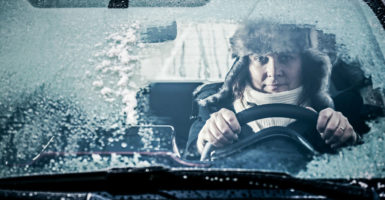Warming up the car while enjoying a morning coffee is a time-honored tradition for millions of Americans every winter day.
But Roseville, Michigan, resident Nick Taylor learned that it is also illegal in his home state. Taylor received a $128 ticket for leaving his car sitting in idle to warm up in his own driveway.
And Michiganders are far from alone in their subjugation to this law.
According to a compilation by the Environmental Protection Agency, residents in over half of the states are subject to state or local regulations on idling vehicles. Failure to comply with idling restrictions can trigger a variety of fines or even get your car towed, depending on the jurisdiction.
Although leaving keys in the ignition of a running vehicle might not be the smartest decision—Roseville Police Chief James Berlin pointed out the ease of theft when someone leaves their car running—must the government use fines and other penalties to prevent people from making imprudent decisions?
This threat, along with perceived environmental concerns, forms the basis for regulating this conduct. But the punishment often seems to outweigh the harm done by the offense.
For instance, in Washington, D.C., a first-time offender who violates the anti-idling law could receive a civil infraction ticket for up to $1,000. Penalties double in D.C. for subsequent offenses, up to a maximum of $4,000.
Other jurisdictions show a bit more compassion in providing exemptions from the law when temperatures drop below freezing. Denver, Colorado, for one, is willing to relieve residents of the maximum $999 fine for leaving a car idling for over five minutes if the temperature outside dips below 10 degrees.
Some places take the penalties particularly overboard by categorizing an idling violation as a criminal misdemeanor. Ohio, Texas, and select cities in California all impose criminal penalties for leaving a car running unattended.
In Ohio specifically, if a resident was already guilty of a traffic offense within the previous year, the idling violation is elevated to a fourth degree misdemeanor, which is punishable by up to 30 days in jail—a steep price to pay for staying warm.
To compound the issue, a National Insurance Crime Bureau study found that car thefts are on the rise in Ohio. It looks like rather than reducing car thefts, these laws actually make for more criminals.
While commonsense exceptions can help alleviate the burden of little-known laws on ordinary citizens, the concern remains that a law enforcement official can write a ticket for trivial, everyday conduct taking place in one’s own driveway.
Such policies are ripe for selective enforcement and impose an undue financial burden on citizens.
If the government wants to get into the business of fining people for making stupid decisions, there are many places to start before writing tickets for someone who keeps a car running right outside their own home.
Lucky for the owners of fancy new vehicles with remote start technology, starting your car on a smartphone from the comfort of your breakfast table does not violate anti-idling ordinances, according to Berlin, because the keys are not in the ignition.
However, an officer likely would have to get awfully close to one’s private property to be able to discern whether or not a car is utilizing remote start and in compliance with applicable laws and regulations.
The mere fact that a citizen minding his own business can face a hefty fine for such common behavior demonstrates a systemic flaw in the legal code. Law enforcement need not police every misstep that occurs in society by playing the role of a nosy neighbor who peeks through the blinds to critique what a resident is doing across the street.
The time and resources of law enforcement officers would be much better spent fulfilling the vital role they play in society, rather than issuing criminal citations and levying fines on drivers simply trying to stay warm in the winter.
























